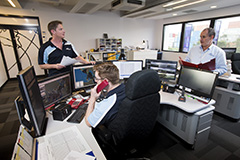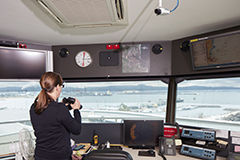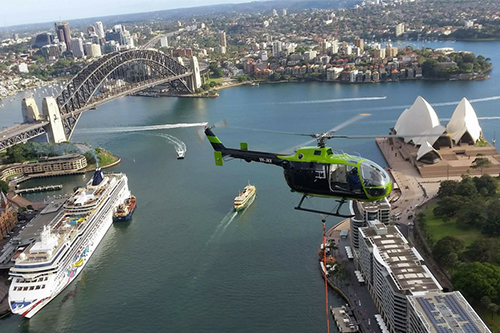12/12/2019 10:41 AM
People of ports: meet the Vessel Traffic Services operators
“You've got to be on your toes, anything can happen.” Meet two of Port Authority’s VTS team and find out how they keep watch over the ports of NSW.
From their control centres in Sydney, Newcastle and Port Kembla, Port Authority’s VTS team work 24/7 365 to keep watch over our ports. Here are two of the team on their role in keeping shipping safe in NSW.
What’s the role of the Vessel Traffic Services team?
Lee: We’re like air traffic control for ships. We talk to ships up and down the coast and help bring them safely in and out of the ports. We schedule arrival and departure times, communicate with the marine pilots and coordinate the movements of the biggest commercial vessels in our ports.
Michelle: We monitor shipping movements and ensure that marine pilots meet the vessels out at sea safely. We also advise ships of inclement weather and unfavourable sea conditions. We make regular broadcasts to let ships know the local conditions so they can take appropriate action.
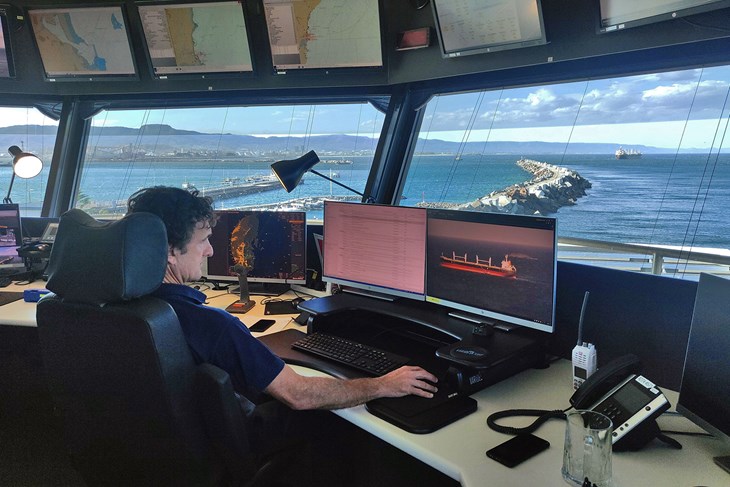 Image: Lee from Port Authority's VTS team keeps track of a ship leaving Port Kembla
Image: Lee from Port Authority's VTS team keeps track of a ship leaving Port Kembla
How do you communicate with ships?
L: The ships rely on us for critical safety information. We communicate via VHF radio or with the ship’s agent if further out to sea.
M: We communicate with ship captains on vessels from all over the world so we use standard maritime phrases to make sure everyone understands critical information. This includes using message markers, such as prefixing a question or answer with 'question' and 'answer'. It sounds unusual but it’s important to make sure communication is clear and understood — after all, many captains might not speak English as a first language.
How do you assist with emergency situations in the port?
L: We’re the first point of contact for any potential emergencies in the port. We keep watch for incidents like oil spills, fires, stricken vessels and man overboard situations. But our work also helps reduce the likelihood of any incident occurring.
M: We keep a visual watch for potential hazards in the port, through multiple CCTV cameras and from our control centre. If something does happen, we're the team who coordinates the response with emergency services. We'll notify fire, ambulance or police, as well as the harbour master, to get the response underway.
What’s the most challenging aspect of this work?
L: We’ re here 24/7 365 days a year — you've got to get used to dealing with whatever comes your way. New situations can arise at any time of day. It might be a situation that hasn’t happened in a year, but all of a sudden you're on, dealing with it, making sure the ship, crew and port is safe. Anything can happen at any time — you've just got to be ready for it.
M: Every day is different: the vessel movements, weather, sea conditions. You need to be prepared for any eventuality.
What skills do you need for this role?
L: To work as a VTS operator you need good communication skills, patience and to be able to deal with pressure and deadlines. You're communicating with ships’ agents, ships’ captains and need to be able to issue clear commands.
M: You need a vessel traffic services operator certificate for this role and at least 12 months on-the-job training. It's a highly responsible position so you need good attention to detail, be a clear communicator and be able to handle challenging situations — staying calm and making sound decisions is vital.
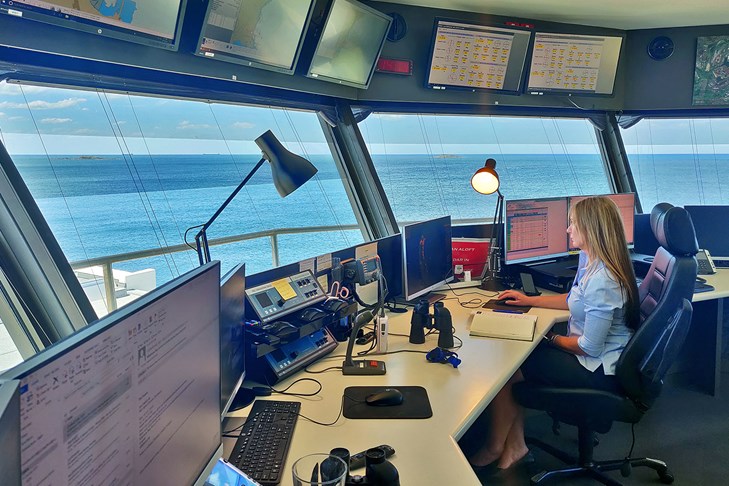 Image: VTS operator Michelle uses the radar to monitor ships approaching port waters
Image: VTS operator Michelle uses the radar to monitor ships approaching port waters
What do you enjoy most about your work?
L: You've got to be on your toes, anything can happen. A quiet afternoon can quickly turn into an action-packed shift. The winds may change, a ship may break lines and you must respond: calling the marine pilot and the tugs to help the ship back alongside quickly and safely.
M: It gets interesting when you must adapt to changing port conditions. There are so many variables, no two days are the same. Its important work — ships depend on us every day.
VTS: air traffic control of the sea
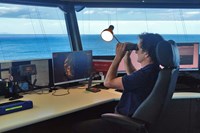 Every airport needs its air traffic control but what about the ships in our seaports? Here’s how Port Authority’s VTS teams keep watch 24/7 to keep shipping safe in NSW.
Every airport needs its air traffic control but what about the ships in our seaports? Here’s how Port Authority’s VTS teams keep watch 24/7 to keep shipping safe in NSW.
Read more.
Subscribe to our newsletter for more news and stories from the ports and harbours of NSW.





